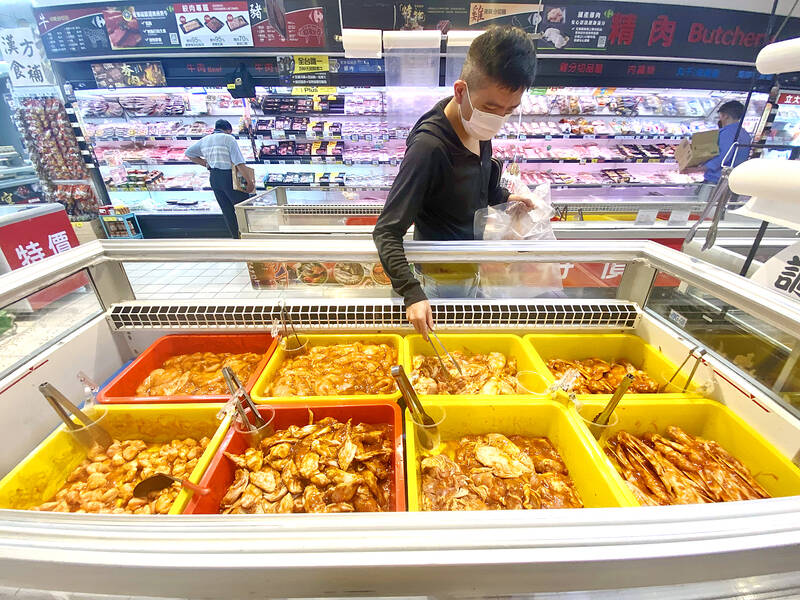The consumer confidence index (CCI) this month shed 0.78 points to 66.73, with all six components weakening in line with a prevalent conservative sentiment, a survey released by National Central University said.
Though the retreat is small, poor exports pose a threat that would take a toll on the job market and private consumption, said Dachrahn Wu (吳大任), director of the university’s Research Center for Taiwan Economic Development, which conducted the survey.
Taiwan does not have much to do to reverse exports, which depend largely on when the US Federal Reserve would end its monetary tightening policy and allow global consumers to regain interest in technology products, Wu said.

Photo: CNA
The subindex on buying interest of durable goods, mainly real estate, recorded the biggest drop of 1.2 points to 110.2, the monthly survey showed.
The survey was conducted by interviewing 2,994 adults on the telephone from Sept. 17 to Wednesday last week.
Confidence readings of 100 or more suggest optimism and scores below the threshold indicate pessimism. According to the survey, interest in durable goods stayed strong despite a mild decline.
Taiwan’s private consumption has proved resilient, like the rest of the world in the post-COVID-19 pandemic era, but the trend might not last long if exports remain weak, Wu said.
The government’s recent introduction of low interest rates of 1.775 percent for first-home purchases injected a vigor to the local property market, the survey showed.
Wu said that the measure on consumer price outlook edged down 0.9 points to 24.9, with most people expecting continued price hikes ahead.
Wu said that he is not particularly worried about inflationary pressures that have subsided significantly and it would return to the central bank’s 2 percent target next year.
The gauges on household incomes and stock investment dropped 0.75 points and 0.6 points to 74.95 and 44.9 respectively, as artificial intelligence interest cooled and related stocks went through drastic price corrections.
Public confidence on the nation’s economy in six months softened 0.75 points to 80, bucking the government’s projection for an economic recovery from next month onward.

When an apartment comes up for rent in Germany’s big cities, hundreds of prospective tenants often queue down the street to view it, but the acute shortage of affordable housing is getting scant attention ahead of today’s snap general election. “Housing is one of the main problems for people, but nobody talks about it, nobody takes it seriously,” said Andreas Ibel, president of Build Europe, an association representing housing developers. Migration and the sluggish economy top the list of voters’ concerns, but analysts say housing policy fails to break through as returns on investment take time to register, making the

NOT TO WORRY: Some people are concerned funds might continue moving out of the country, but the central bank said financial account outflows are not unusual in Taiwan Taiwan’s outbound investments hit a new high last year due to investments made by contract chipmaker Taiwan Semiconductor Manufacturing Co (TSMC, 台積電) and other major manufacturers to boost global expansion, the central bank said on Thursday. The net increase in outbound investments last year reached a record US$21.05 billion, while the net increase in outbound investments by Taiwanese residents reached a record US$31.98 billion, central bank data showed. Chen Fei-wen (陳斐紋), deputy director of the central bank’s Department of Economic Research, said the increase was largely due to TSMC’s efforts to expand production in the US and Japan. Investments by Vanguard International

WARNING SHOT: The US president has threatened to impose 25 percent tariffs on all imported vehicles, and similar or higher duties on pharmaceuticals and semiconductors US President Donald Trump on Wednesday suggested that a trade deal with China was “possible” — a key target in the US leader’s tariffs policy. The US in 2020 had already agreed to “a great trade deal with China” and a new deal was “possible,” Trump said. Trump said he expected Chinese President Xi Jinping (習近平) to visit the US, without giving a timeline for his trip. Trump also said that he was talking to China about TikTok, as the US seeks to broker a sale of the popular app owned by Chinese firm ByteDance Ltd (字節跳動). Trump last week said that he had

STRUGGLING TO SURVIVE: The group is proposing a consortium of investors, with Tesla as the largest backer, and possibly a minority investment by Hon Hai Precision Nissan Motor Co shares jumped after the Financial Times reported that a high-level Japanese group has drawn up plans to seek investment from Elon Musk’s Tesla Inc to aid the struggling automaker. The group believes the electric vehicle (EV) maker is interested in acquiring Nissan’s plants in the US, the newspaper reported, citing people it did not identify. The proposal envisions a consortium of investors, with Tesla as the largest backer, but also includes the possibility of a minority investment by Hon Hai Precision Industry Co (鴻海精密) to prevent a full takeover by the Apple supplier, the report said. The group is